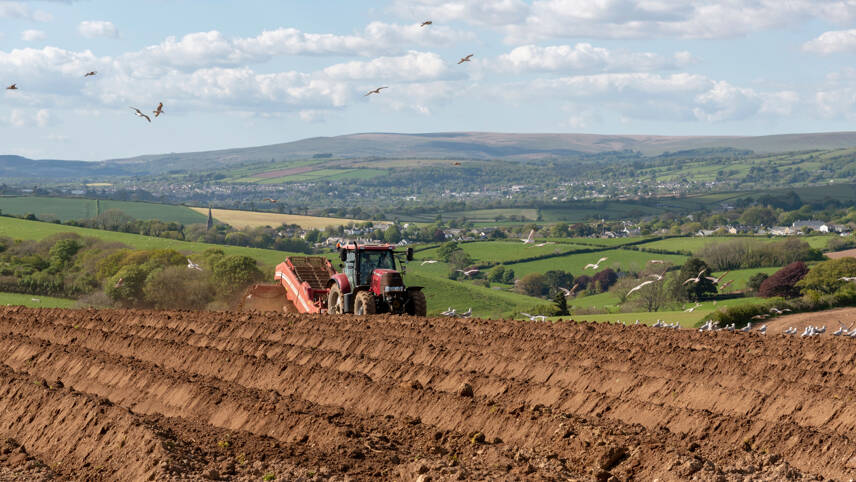Register for free and continue reading
Join our growing army of changemakers and get unlimited access to our premium content

Charities including the WWF, RSPB and the National Trust are partnering with a host of farmers and a selection of business leaders to raise awareness of the need to improve nature in agriculture in the UK.
The charities, supported by former Defra advisor Henry Dimbleby MBE and the chief executives of Tesco, NatWest and Triodos Bank and the chair of the John Lewis Partnership, warn that the UK’s food system is driving biodiversity decline.
The UK has lost almost half of its biodiversity since the industrial revolution and recent reports about high pollution levels in the UK’s rivers have attracted significant public attention to the declining state of the UK’s natural environments.
The group is calling for UK businesses to step up action as a result.
The John Lewis Partnership’s chair Dame Sharon White said: “The only sustainable way forward for us as a business, indeed I would argue for any business, is to be Nature Positive because without being Nature Positive, ultimately, you can’t be profit positive.”
To raise awareness, the groups are circulating a new film – Hungry for Change – that highlights the solutions available to farmers to prioritise biodiversity while cutting back on food loss.
The charities also note that the public is demanding change from businesses.
Late last year, the National Trust, the RSPB, and WWF joined forces with celebrity champions Maisie Williams and Cel Spellman to launch the People’s Plan for Nature, a national rallying cry for the public to have its say on how to respond to the ecological crisis.
The People’s Plan for Nature aims to give people from all walks of life across the UK a voice in co-creating a vision for the future of UK nature and is based on a poll from the charities which found that 81% of UK adults believe nature is under threat and urgently needs help while 42% want to take action but don’t feel empowered to do so.
The new plan will include the People’s Assembly for Nature; an independent and representative group of 100 people from across the UK.
Historically, businesses have focused more on climate than nature, despite the interdependencies between the two.
Last month, CDP revealed that 18,600 companies disclosed data on climate last year – a 42% year-on-year increase. Yet less than half of this amount disclosed on biodiversity, and only 1,000 disclosed information on forests.
CDP is warning that, unless nature-related disclosures become far more common and the quality of disclosures improves steeply, businesses will not be prepared for forthcoming regulatory changes.
The Treaty agreed upon by more than 180 countries at the UN’s 15th biodiversity COP in December 2022, for example, includes commitments for nations to mandate nature-related reporting from larger companies by the end of the decade. Such a commitment was advocated for by hundreds of businesses but, as the CDP report proves, a great many thousands more are not ready.
Policy focus
The charities also state that businesses need to be supported by enabling policies that allow farmers to transition to nature-positive and net-zero practices.
At the start of the year, the UK Government provided more information on its post-Brexit payment schemes for farmers, intended to support practices that conserve and restore nature while maintaining food security.
Farmers are able to claim payments for improving hedgerow management; ending insecticide use and implementing more natural pest management interventions; optimising the use of fertilisers to limit nutrient runoff; planting flower-rich margins and incorporating “companion crops”.
Farmers and environmental groups alike expressed concerns over the financial wellbeing of British farmers late last year amid delays to reviews of these subsidy schemes.
Concerns persist that the Government is not doing enough to incentivise farmers to enshrine nature into their plans. This week’s Food Summit was seen by many green groups as the ideal opportunity to incentivise net-positive farming practices.
However, the Horticulture Alliance dropped out of the event in frustration over Defra’s decision not to develop a dedicated horticulture strategy.
The UK imports more than half of its produce and there is evidence that worsening soil quality and changing weather patterns could bring new risks in the future, both at home and abroad. Beyond resilience, the Alliance wanted a strategy to boost public campaigning and education on eating more fruits and vegetables, plus increased financial support for farmers.
More broadly, MPs have stated that the Government’s “poorly mixed cocktail” of policy is driving biodiversity decline.
Commenting on the need for action, Tony Juniper, Chair of Natural England, who also appears in the film, said: “We’re now at five minutes to midnight… now is the time to take an integrated approach, whereby nature recovery migrates to the centre of economic thinking.”


Please login or Register to leave a comment.